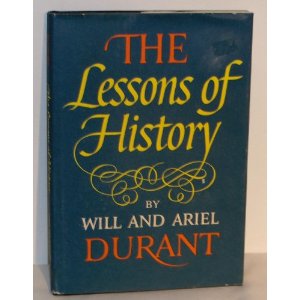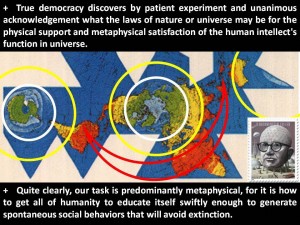 WOW! A Jewel Pops Out of Amazon's Recommendation System, October 14, 2008
WOW! A Jewel Pops Out of Amazon's Recommendation System, October 14, 2008
Will Durant
EDIT of 30 May 2009 to add flyleaf notes.
I was utterly THRILLED to see this book by Will Durant, published in 2005, pop up out of Amazon's recommendation system. Now I'm hooked.
The book opens with suicide statistics to point out the ultimate sacrifice or loss when hope is not to be found. One million in the world, 81,000 in the USA, 84.5 per day, 1 every 17.1 minutes. I have had 18 professional and one personal suicide in my life, What an important opening.
Finished, it surprises and delights with the common sense selections.
Key insights, remembering that this book is an edited collection of many people responding in one page to the QUESTION from Durant, who sent out 100 letters. First published in 1932, all the answers are grounded in the real world.
1) Uncertainty fosters greed.
2) Corruption of a society does not preclude the emergence of great minds that can catalyze further progress.
3) 1000 citivilizations have died in the course of history.
4) Citing Aristotle, all things have been discovered and forgotten manytimes over. Man–imperfect man–is the constant.
5) Utopia would be birth control, enfranchisement of all, emancipation of all–all of this is undone by crime, corruption, and war, none of which are necessary
Four quotes I feel should be here to encourage purchase of the book:
a) “We are driven to conclude that the greatest mistake in human history was the discovery of ‘truth.' It has not made us free, except from delusions that comforted us and restraints that preserved us.” Page 14
b) “Where such a faith [that gives hope], after supporting men for centuries, begins to weaken, like narrows down from a spiritual drama to a biological episode, it sacrifices the dignity conferred by a destiny endless in time, and shrinks to a strange interlude between a ridiculous birth and an annihilating death.” Page 17
c. “We discovered birth control, and now it sterlizes the intelligent, multiplies the ignorant, debases love with promuscuity, frustrates the educator, empowers the demagogue, and deteriorates the race.” Page 29
d. “The greatest questions of our time is not communism vs. the West, it is whether men can bear to live without God.” Page 34
All of the above are Durant's words. Then the book goes forward with two pages for each of those responding, one a graphic etching, the other their text.
The Lessons of History
The Landscape of History: How Historians Map the Past
Integral Consciousness and the Future of Evolution
How to Change the World: Social Entrepreneurs and the Power of New Ideas, Updated Edition
The leadership of civilization building: Administrative and civilization theory, symbolic dialogue, and citizen skills for the 21st century
Consilience: The Unity of Knowledge
The Future of Life
DVD: What the Bleep Do We Know!?






